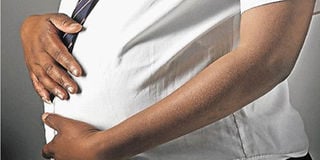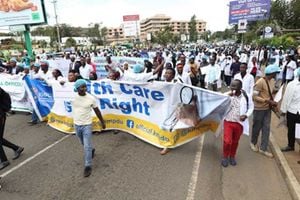
Currently, teenage mums are identified using their mothers' ID cards.
Kenyan parents with expectant teenagers will now be compelled to dig deeper into their pockets for insurance cover for their pregnant underage children. This follows the Social Health Authority (SHA) introducing a ‘temporary ID’ option within its Integrated Healthcare Information Technology System (IHTS) targeting them.
Speaking on Tuesday during the signing of an MoU between SHA and the Murang’a County Government aimed at sponsoring 31,416 poor and vulnerable households in the county, acting SHA CEO Robert Ingasira disclosed that expectant teenagers would be subject to a means-testing tool to determine the amount they will pay.
“For teenage mothers, we now have a ‘temporary ID’ option, which means they will be required to register independently of their parents. The initial arrangement, where teenage mothers were identified using their mother’s IDs, created problems because some mothers were still of childbearing age. So, we found instances where a mother was reportedly said to have given birth twice in a year just because her ID was used not only for her own delivery but also for her daughter’s,” the CEO explained.
“We have now created a special number that will be used to identify teenage mothers. Regarding Linda Mama, as expectant teens visit the hospital, they will now be required to register, after which we will perform means testing to determine the amount they should pay for the Social Health Insurance Fund (SHIF). If they are unable to pay, the government will cover their costs,” he added.
“Unlike Linda Mama, our new option covers the entire year, which makes it a better programme. It is currently being piloted at Pumwani, and soon we will roll it out across all contracted health facilities.”
A ‘means-testing tool’ is a function within the IHTS system that uses computational algorithms to evaluate a person’s lifestyle and generates an amount they should pay.
According to SHA, the registration template includes 17 curated questions for individuals to answer. Based on their responses, the system calculates the annual amount they are expected to pay.
For instance, if the system asks about the type of television set in your living room and you respond that it is worth Sh500,000, the system may classify you as wealthy and charge you a higher fee, regardless of whether the TV was a gift.
Before the government launched the nationwide insurance scheme on October 1, 2024, MPs on the health committee, led by Endebess MP Robert Pukose, tested the system using a father of four who could not afford a Sh300 meal a day and owned a small emaciated cow inherited from his late father.
To their surprise, the system indicated that the man’s household should pay Sh20,000, according to the means-testing tool.
When Nation sought an explanation from SHA CEO Elijah Wachira, currently on forced leave, he said the government categorised hustlers into two levels.
Compared to the now-defunct National Hospital Insurance Fund (NHIF), Kenyans will now pay based on their ability.
“We have two levels of hustlers. Level 1 includes individuals like the mama mboga, who runs a small business with irregular income. We will use the means-testing tool to determine their income cycle and set a premium they can afford. After this, we will make financing arrangements for advance payment and monthly balances,” Mr Wachira explained.
He added that community health promoters (CHPs) would visit informal settlements and, using devices provided by the government, determine the amounts to be paid. “One thing is certain: nobody will pay less than Sh300, meaning the minimum has been reduced from Sh500 to Sh300.”
Level 2 includes individuals with no income at all. “If you are over 18, have a family, but your income status indicates you cannot raise money, the Act recognises you as indigent.
The government will pay the premium on your behalf using funds from the Exchequer. Both national and county governments will sponsor indigents,” Mr Wachira said.
However, Mr Ingasira clarified that for expectant teenage mothers, the premium will be displayed after means testing. “At that stage, the expectant teenager will decide if they are able to pay or need assistance. If they require help, the government will pay the annual premium,” he said.
“The annual premium entitles the teenage mother to the same benefits as any fully paid member, and the services they receive will be based on current tariffs,” he added.









